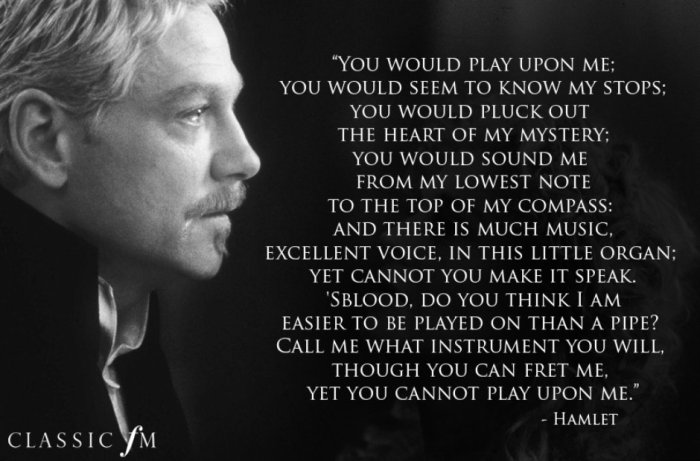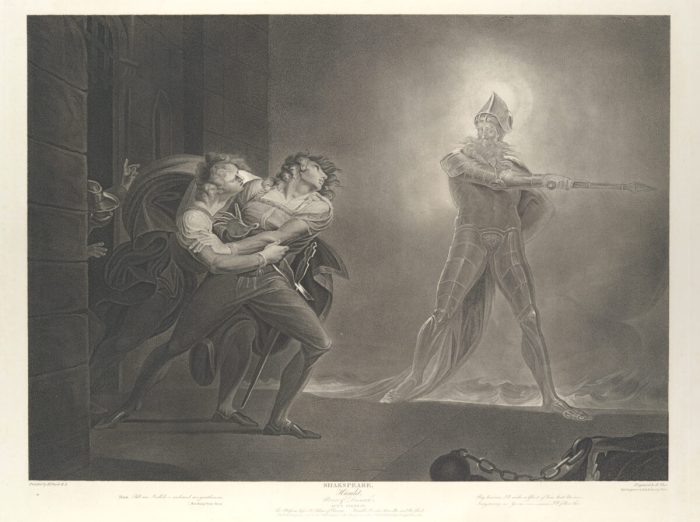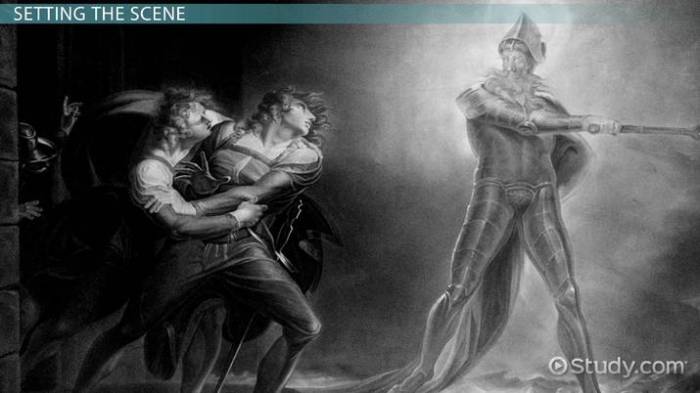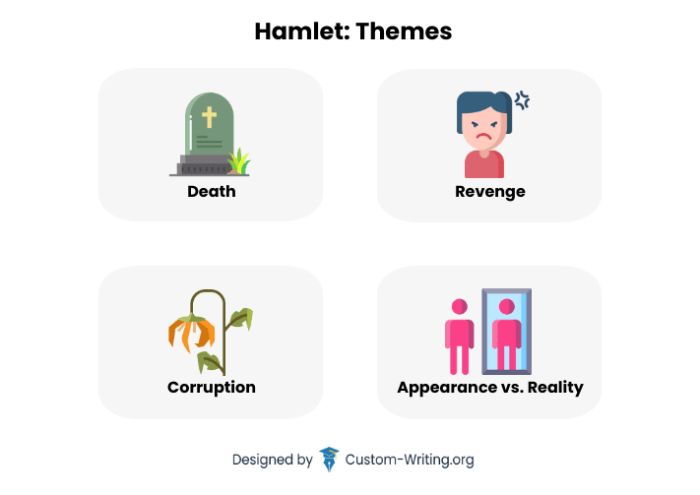Hamlet act 4 important quotes – Hamlet Act 4, a whirlwind of introspection, deceit, and vengeance, unfolds through a series of unforgettable exchanges. From Hamlet’s existential musings to Claudius’s desperate plea for redemption, each quote carries profound significance, shaping the play’s characters and themes.
As we delve into these pivotal utterances, we uncover the tormented psyche of Hamlet, the guilt-ridden conscience of Claudius, and the shattered relationships that drive the tragedy towards its inevitable conclusion.
Hamlet’s Soliloquy on Death (Act 4, Scene 4)

In the midst of chaos and uncertainty, Hamlet confronts the ultimate question of life and death in his poignant soliloquy in Act 4, Scene 4. This introspective moment serves as a turning point in his character development, as he grapples with the existential complexities of mortality.
Contemplation of Suicide
Hamlet’s contemplation of suicide reveals his profound disillusionment with life. The world he once knew has crumbled around him, leaving him questioning the very purpose of existence. He weighs the pros and cons of ending his own life, debating the moral implications and the potential relief from his torment.
Existential Musings
Beyond the immediate question of suicide, Hamlet’s soliloquy explores broader existential themes. He ponders the nature of death and the unknown that lies beyond it. His musings on the afterlife and the fear of eternal punishment reflect the profound uncertainty and dread that plague him.
Imagery and Language, Hamlet act 4 important quotes
The imagery and language employed in Hamlet’s soliloquy are evocative and powerful. He uses metaphors of disease, decay, and darkness to convey the anguish and despair he feels. The contrast between light and dark imagery symbolizes his inner conflict and the struggle between his desire for life and his contemplation of death.
Claudius’s Prayer (Act 4, Scene 3)

Claudius’s prayer in Act 4, Scene 3, is a pivotal moment in the play. After committing multiple heinous crimes, including murder and regicide, Claudius attempts to seek forgiveness from God. This prayer reveals his inner turmoil and desperation, as well as the dramatic irony and tension that surround his character.
Claudius’s Motives and Attempt at Forgiveness
Claudius’s motives for praying are complex. He is haunted by guilt and remorse for his actions, and he desperately seeks redemption. However, his prayer is also an attempt to justify his crimes and escape punishment. Claudius believes that if he can convince God to forgive him, he will be absolved of his sins and able to continue his reign as king.
Dramatic Irony and Tension
The dramatic irony of Claudius’s prayer is that the audience knows he is guilty of heinous crimes. We are aware of his true nature and his lack of genuine repentance. This creates a sense of tension and suspense as we watch Claudius struggle to reconcile his actions with his desire for forgiveness.
Implications for Claudius’s Character and the Play’s Themes
Claudius’s prayer has significant implications for his character and the play’s themes. It reveals his deep-seated hypocrisy and his inability to escape the consequences of his actions. The prayer also highlights the play’s themes of guilt, redemption, and the futility of trying to escape one’s fate.
Gertrude’s Conversation with Hamlet (Act 4, Scene 5): Hamlet Act 4 Important Quotes

Hamlet’s confrontation with Gertrude in Act 4, Scene 5, marks a significant turning point in their relationship and in Hamlet’s quest for revenge.
Hamlet’s Accusations
Hamlet accuses Gertrude of betraying his father and marrying Claudius, his murderer. He calls her “adulterous” and “incestuous” and accuses her of being “an o’ergrown with rank corruption.”
Gertrude’s Responses
Gertrude is initially shocked and defensive, but she eventually admits her guilt. She explains that she was manipulated by Claudius and that she now regrets her actions. She begs Hamlet for forgiveness, but he refuses.
Impact on Hamlet and Gertrude
This conversation has a profound impact on Hamlet. It confirms his suspicions about Claudius and Gertrude, and it deepens his anger and resolve to seek revenge. It also damages his relationship with Gertrude, who he now sees as a traitor.
For Gertrude, this conversation is a moment of reckoning. She is forced to confront her own guilt and the consequences of her actions. It is a painful experience, but it may also be a catalyst for her redemption.
Laertes’ Return and Conspiracy with Claudius (Act 4, Scene 5)

Laertes’ return to Denmark is driven by his grief and anger over the deaths of his father, Polonius, and his sister, Ophelia. He believes Hamlet is responsible for these deaths and seeks revenge. Claudius exploits Laertes’ grief and anger to manipulate him into a plot to kill Hamlet.
In Hamlet’s fourth act, several significant quotes stand out, reflecting the play’s themes of mortality, madness, and revenge. To further explore these themes, I recommend checking out the unit 5 apush practice test . This resource provides valuable insights into the complexities of Hamlet’s Act 4, enriching your understanding of the play’s enduring significance.
Similarities and Differences between Hamlet’s and Laertes’ Motivations for Revenge
- Both Hamlet and Laertes are motivated by the deaths of loved ones.
- Both Hamlet and Laertes are driven by a desire for justice.
- However, Hamlet’s motivations are more complex than Laertes’. Hamlet is also motivated by a sense of duty to avenge his father’s murder and by a desire to expose Claudius’s corruption.
Potential Consequences of Laertes’ Actions for the Play’s Tragic Climax
Laertes’ actions have several potential consequences for the play’s tragic climax.
- Laertes’ plot to kill Hamlet could lead to Hamlet’s death.
- Laertes’ actions could also lead to the deaths of other characters, such as Claudius and Gertrude.
- Laertes’ actions could contribute to the play’s overall atmosphere of tragedy and despair.
Hamlet’s Duel with Laertes (Act 4, Scene 7)

Hamlet and Laertes’ duel, instigated by Claudius’s treacherous scheme, marks a pivotal moment in the play. Fueled by grief and a thirst for vengeance, their clash encapsulates the play’s tragic trajectory.
Circumstances Leading to the Duel
Hamlet’s accidental killing of Polonius incites Laertes’ desire for revenge. Claudius, seeing an opportunity to eliminate Hamlet, manipulates Laertes by suggesting Hamlet murdered his father out of jealousy. He devises a treacherous plan for a duel, where Laertes’ sword will be tipped with poison.
Symbolism and Significance
The duel symbolizes the play’s themes of revenge, honor, and fate. It represents the inevitable confrontation between the protagonist and his antagonist, a clash that mirrors the internal struggle within Hamlet himself. The poisoned sword foreshadows the play’s tragic end.
Impact on Characters and Resolution
The duel has devastating consequences. Hamlet, Laertes, and Gertrude are fatally poisoned, while Claudius is killed by Hamlet. The play’s tragic resolution is a direct result of the duel, underscoring the destructive nature of vengeance and the inevitability of fate.
FAQ Summary
What is the significance of Hamlet’s soliloquy on death?
Hamlet’s soliloquy on death reveals his contemplation of suicide and his existential musings on the meaning of life and death.
Why does Claudius pray?
Claudius prays in an attempt to seek forgiveness for his sins, including the murder of Hamlet’s father.
What is the nature of Hamlet’s conversation with Gertrude?
Hamlet’s conversation with Gertrude is confrontational, as he accuses her of complicity in his father’s murder.
What are the reasons behind Laertes’ return and alliance with Claudius?
Laertes returns to avenge the death of his father, Polonius, and allies with Claudius to seek revenge against Hamlet.